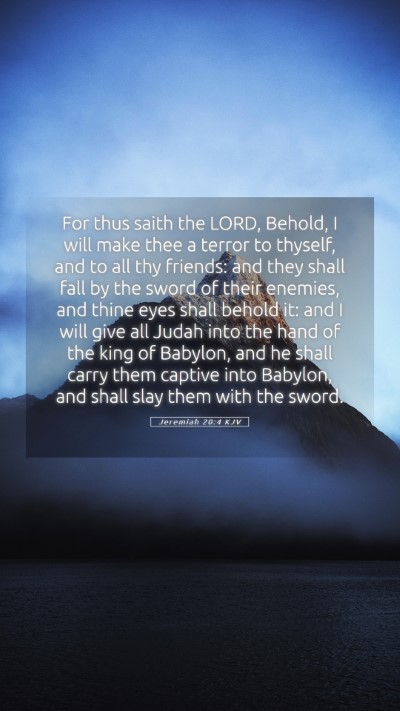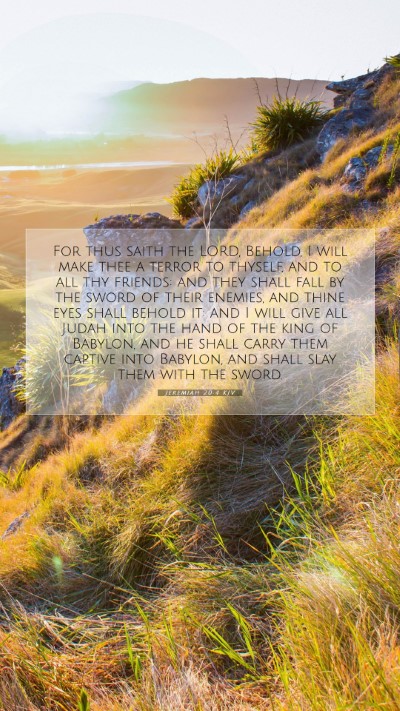Understanding Jeremiah 20:4
Verse: Jeremiah 20:4 - "For thus saith the Lord; Behold, I will make thee a terror to thyself, and to all thy friends: and they shall fall by the sword of their enemies, and thine eyes shall behold it: and I will give all Judah into the hand of the king of Babylon."
This verse is part of a larger narrative in the Book of Jeremiah where the prophet Jeremiah expresses his deep frustrations and feelings of betrayal in his prophetic calling. Understanding this verse involves diving into various aspects such as context, purpose, and implications of the message conveyed.
Contextual Background
The Book of Jeremiah deals with the themes of prophecy, judgment, and redemption. Jeremiah was called to deliver God’s messages to the people of Judah during a tumultuous time leading up to the Babylonian exile. His role was not only to foretell impending doom but also to encourage a return to God. In this verse, God gives Jeremiah a stark warning that conveys the inevitable consequences of disobedience amongst the people.
Verse Explanation
This verse communicates God's intention to make Jeremiah's own friends and companions fearful, reflecting the isolation and shame that often accompany the life of a prophet. Here's a detailed breakdown based on public domain commentaries:
-
Matthew Henry's Commentary:
Henry emphasizes that God is indicating a time of severe judgment. The terror that Jeremiah would experience is tied to the fact that he is God’s messenger, relaying grave news. Henry also mentions the emotional burden that this entails – Jeremiah would witness the destruction of his loved ones, reminding readers that the call of a prophet often comes with personal cost.
-
Albert Barnes' Notes:
Barnes adds insight into the broader implications of God's decree over Judah. He notes that the sword symbolizes not just physical death, but the spiritual and moral failure of the nation. The message serves as a warning, highlighting the consequences of rebellion against divine authority.
-
Adam Clarke's Commentary:
Clarke provides a poignant interpretation, indicating that Jeremiah’s message comes with a heavy emotional weight. He discusses the historical context that Jeremiah's contemporaries failed to heed, leading to their destruction. Clarke highlights the gravity of divine warning and the suffering that results from a nation's unfaithfulness.
Thematic Insights
Through Jeremiah 20:4, we observe several pivotal themes:
-
Prophetic Burden:
The life of a prophet is fraught with challenges, often leading to alienation. Jeremiah’s prophetic role leads to bitter experiences, showcasing that truly serving God can come with severe trials.
-
Judgment and Consequences:
The verse starkly illustrates that unrepentance leads to dire consequences. The call to awareness helps audiences today consider their own spiritual actions and societal responsibilities.
-
Isolation in Prophetic Service:
The isolation faced by Jeremiah underlines the loneliness that can accompany standing firm in one's beliefs. It invites reflection on the nature of friendship and betrayal in the face of conviction.
Cross References
This verse connects to several other passages, enriching the understanding of its message:
- Jeremiah 15:10 - Jeremiah laments his fate being a prophet.
- Jeremiah 34:17 - Judgment against the unfaithful.
- Lamentations 3:15-16 - The bitterness faced by the prophet.
- Isaiah 59:1-2 - Divine separation due to sin.
- Ezekiel 12:19 - Similar themes of prophetic warnings and judgments.
Conclusion
In summary, Jeremiah 20:4 offers profound insights into the nature of prophetic ministry and the consequences of disobedience. The verse captures the tension between God's judgment and the reality of personal suffering that comes with faithfully delivering His messages. Through a careful examination of this verse – using scripture analysis, biblical exegesis, and commentary perspectives – one can gain a deeper understanding of both the historical context and its application to modern life.
Further Exploration
For those interested in broadening their understanding of scripture through Bible study resources, consider engaging with Bible study groups or utilizing online Bible study tools that facilitate learning and discussions pertaining to similar themes found in Jeremiah’s prophecies. Resources that guide users on how to interpret Bible verses and provide historical context can further enhance one's biblical study experience.


